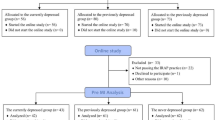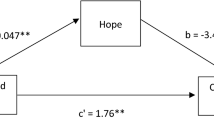Abstract
Attributions (globality and stability) related to the reformulated learned helplessness (RLH) model of depression, and attributes, self-evaluations, and expectancies concerning coping reactions (degree of upset, success, satisfaction, control in future, future coping success) postulated by Wortman and Dintzer (1978) were examined for their respective relations to severity and prevalence of diagnosable depression in a highly stressed sample (N =68) of spouse caregivers of Alzheimer's disease patients. Subjects' attribution-related cognitions concerning two situational contexts were obtained: (1) an unpredictable upsetting behavior by the Alzheimer patient, and (2) significant life change experienced by the caregiver as a result of his/her spouse's Alzheimer's disease. The results indicated that only globality was related to depression for the Alzheimer patient's unpredictable behavior; however, both globality and stability were related to depression for the subject's life change situation. The pattern of the other depressogenic coping cognitions was also different for the two contexts: While ratings of upset and lack of current and future control were related to depression for the Alzheimer patient's behavior, ratings of poor current and future coping, lack of coping success, and coping dissatisfaction were related to depression for the subject's life change context. The discussion of the contextual specificity of coping cognitive patterns focused on the possible significance of the intrapersonal versus the interpersonal nature of the situational context.
Similar content being viewed by others
References
Abramson, L. Y., Seligman, M. E. P., & Teasdale, J. (1978). Learned helplessness in humans: Critique and reformulation.Journal of Abnormal Psychology, 87 49–79.
Beck, A. T. (1967).Depression: Clinical, experimental and theoretical aspects. New York: Hoeber.
Beck, A. T., & Beamesderfer, A. (1974). Assessment of depression: The depression inventory. In P. Pinchot & R. Olivier-Martin (Eds.),Modern problem of pharmacopsychiatry.
Bulman, R. J., & Wortman, C. B. (1977). Attributions of blame and coping in the “real world”: Severe accident victims react to their lot.Journal of Personality and Social Psychology, 35 351–363.
Coyne, J. C., & Holroyd, K. (1982). Stress, coping, and illness: A transactional perspective. In T. Millen, C. Green, & R. Meagher (Eds.),Handbook of clinical health care psychology. New York: Plenum Press.
Endicott, J. P., & Spitzer, R. L. (1978). A diagnostic interview: The schedule for affective disorders and schizophrenia.Archives of General Psychiatry, 35 837–844.
Hammen, C., & deMayo, R. (1982). Cognitive correlates of teacher stress and depressive symptoms: Implications for attributional models of depression.Journal of Abnormal Psychology, 91 96–101.
Heston, L. L., Mastri, A. R., Anderson, V. E., & White, J. (1981). Dementia of the Alzheimer type.Archives of General Psychiatry, 38 1085–1091.
Hollingshead, A. B. (1957).Two factor index of social postions. New Haven: Yale University.
Lazarus, R. S., & Launier, R. (1978). Stress-related transactions between person and environment. In L. A. Pervin & M. Lewis (Eds.),Internal and external determinants of behavior. New York: Plenum.
Manley, P. C., McMahon, R. J., Bradley, C. F., & Davidson, P. O. (1982). Depressive attributional style and depression following childbirth.Journal of Abnormal Psychology, 91 245–254.
Miller, I. W., & Norman, W. H. (1979). Learned helplessness in humans: A review and attribution theory model.Psychological Bulletin, 86 93–118.
Ross, L. (1977). The intuitive psychologist and his shortcomings: Distortions in the attributions process. In L. Berkowtiz (Ed.),Advances in experimental social psychology (Vol. 10). New York: Academic Press.
Seligman, M. E. P. (1981). A learned helplessness point of view. In L. P. Rehm (Ed.),Behavior therapy for depression: Present status and future directions (pp. 123–143). New York: Academic Press.
Seligman, M. E. P., Abramson, L. Y., Semmel, A., & von Baeyer, C. (1979). Depressive attributional styleJournal of Abnormal Psychology, 88 242–247.
Spitzer, R., Endicott, J., & Robins, E. (1978).Research diagnostic criteria for a selected group of functional disorders. New York: Biometric Research Unit, New York State Psychiatric Institute.
Weiner, B. (1974).Achievement motivation and attribution theory. Morristown, New Jersey: General Learning Press.
Wortman, C. B., & Dintzer, L. (1978). Is an attributional analysis of the learned helplessness phenomenon viable?: A critique of the Abramson-Seligman-Teasdale reformulation.Journal of Abnormal Psychology, 87 75–90.
Zuroff, D. C. (1981). Depression and attribution: Some new data and a review of old data.Cognitive Therapy and Research, 5 273–281.
Author information
Authors and Affiliations
Additional information
This study was funded by National Institute of Mental Health Grant MH33779 to the third author.
Rights and permissions
About this article
Cite this article
Coppel, D.B., Burton, C., Becker, J. et al. Relationships of cognitions associated with coping reactions to depression in spousal caregivers of Alzheimer's disease patients. Cogn Ther Res 9, 253–266 (1985). https://doi.org/10.1007/BF01183845
Issue Date:
DOI: https://doi.org/10.1007/BF01183845




